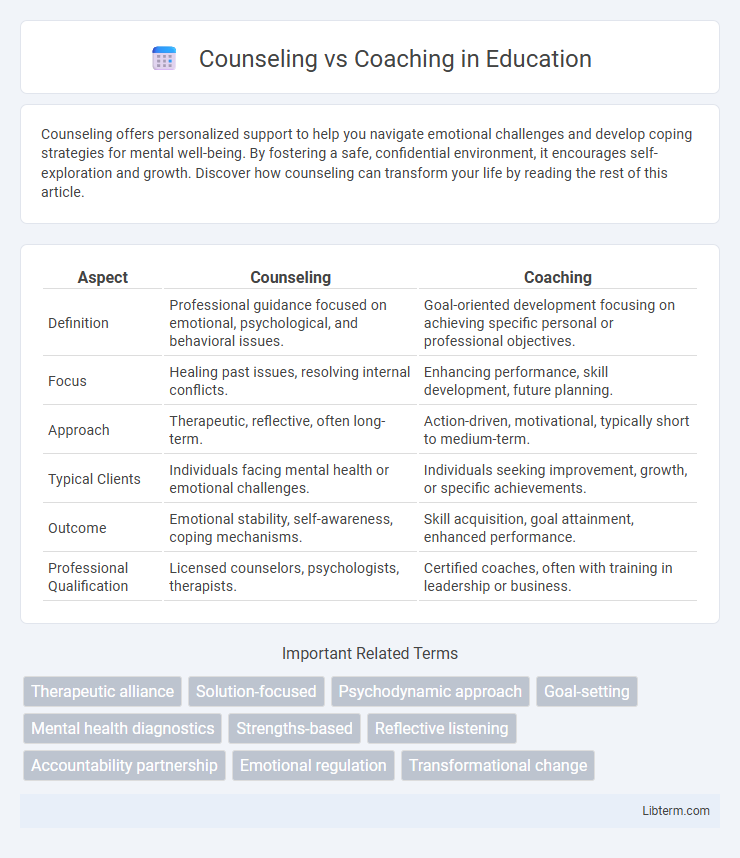Counseling offers personalized support to help you navigate emotional challenges and develop coping strategies for mental well-being. By fostering a safe, confidential environment, it encourages self-exploration and growth. Discover how counseling can transform your life by reading the rest of this article.
Table of Comparison
| Aspect | Counseling | Coaching |
|---|---|---|
| Definition | Professional guidance focused on emotional, psychological, and behavioral issues. | Goal-oriented development focusing on achieving specific personal or professional objectives. |
| Focus | Healing past issues, resolving internal conflicts. | Enhancing performance, skill development, future planning. |
| Approach | Therapeutic, reflective, often long-term. | Action-driven, motivational, typically short to medium-term. |
| Typical Clients | Individuals facing mental health or emotional challenges. | Individuals seeking improvement, growth, or specific achievements. |
| Outcome | Emotional stability, self-awareness, coping mechanisms. | Skill acquisition, goal attainment, enhanced performance. |
| Professional Qualification | Licensed counselors, psychologists, therapists. | Certified coaches, often with training in leadership or business. |
Understanding Counseling and Coaching
Understanding counseling involves exploring therapeutic techniques aimed at addressing emotional, psychological, and behavioral challenges by fostering self-awareness and healing. Coaching focuses on goal-oriented guidance, enhancing personal or professional performance through motivation, accountability, and strategic planning. Both disciplines utilize active listening and communication skills but differ fundamentally in purpose, scope, and outcomes.
Key Differences Between Counseling and Coaching
Counseling primarily addresses mental health issues and emotional healing, focusing on past experiences and trauma, whereas coaching emphasizes goal achievement and personal development by concentrating on future actions. Counselors hold specific clinical qualifications and utilize therapeutic techniques, while coaches employ strategic planning and motivational methods without necessarily requiring formal therapy credentials. The relationship in counseling is often directive and diagnostic, aiming to resolve psychological problems, whereas coaching is collaborative and performance-driven, promoting self-discovery and accountability.
Core Goals of Counseling
Counseling primarily aims to address and resolve emotional, psychological, or behavioral issues by exploring past experiences and underlying causes to promote mental well-being. It focuses on healing, personal growth, and coping strategies for mental health challenges such as anxiety, depression, or trauma. Unlike coaching, which emphasizes future goals and performance improvement, counseling seeks to restore emotional balance and improve overall mental health through therapeutic interventions.
Primary Objectives of Coaching
Coaching primarily aims to enhance an individual's performance, develop specific skills, and unlock personal potential through goal-oriented strategies. Unlike counseling, which addresses psychological issues and emotional healing, coaching focuses on future growth, motivation, and achieving measurable outcomes. Coaches utilize targeted techniques such as action plans, accountability structures, and skill-building exercises to drive continuous improvement.
Techniques Used in Counseling vs Coaching
Counseling employs therapeutic techniques such as active listening, cognitive-behavioral approaches, and emotional exploration to address mental health issues and promote personal healing. Coaching utilizes goal-setting frameworks, motivational interviewing, and performance-driven questioning to enhance skills, achieve specific objectives, and foster professional growth. Both disciplines tailor interventions but counseling prioritizes emotional insight while coaching emphasizes actionable strategies for success.
Who Benefits Most from Counseling?
Individuals experiencing emotional distress, mental health challenges, or trauma benefit most from counseling, as it provides therapeutic support and coping strategies. Counseling suits people seeking to understand and resolve past issues or psychological barriers impacting their well-being. Those aiming for personal healing and emotional growth often find counseling essential for long-term mental health improvement.
Who Should Consider Coaching?
Individuals seeking goal-oriented growth, enhanced performance, and skill development should consider coaching. Professionals aiming to improve leadership, communication, or career advancement benefit from personalized coaching strategies. Coaching suits those ready to take proactive steps toward specific achievements and sustained personal development.
Choosing Between Counseling and Coaching
Choosing between counseling and coaching depends on individual goals and challenges, where counseling addresses mental health issues and emotional difficulties, often rooted in past experiences. Coaching focuses on personal or professional development, goal-setting, and performance improvement, typically targeting future outcomes. Evaluating the need for therapeutic support versus skill-building helps determine the most effective approach for growth and well-being.
Overlapping Areas and Boundaries
Counseling and coaching both aim to support personal growth, yet counseling primarily addresses emotional healing and mental health challenges, while coaching focuses on goal-setting and performance enhancement. Overlapping areas include active listening, goal clarification, and fostering self-awareness, but boundaries are maintained by counselors adhering to therapeutic frameworks and ethical guidelines, whereas coaches concentrate on motivation and skill development without diagnosing or treating psychological disorders. Clear understanding of these distinctions ensures individuals receive appropriate support tailored to their needs.
How to Find the Right Professional for Your Needs
Identifying the right professional for your needs involves understanding the distinction between counseling, which addresses emotional and psychological challenges, and coaching, which focuses on goal-setting and personal development. Research credentials such as licensed therapists for counseling and certified coaches affiliated with recognized organizations like the International Coach Federation (ICF) for coaching. Be sure to evaluate experience, specialization, and client reviews to ensure alignment with your specific mental health or growth objectives.
Counseling Infographic

 libterm.com
libterm.com